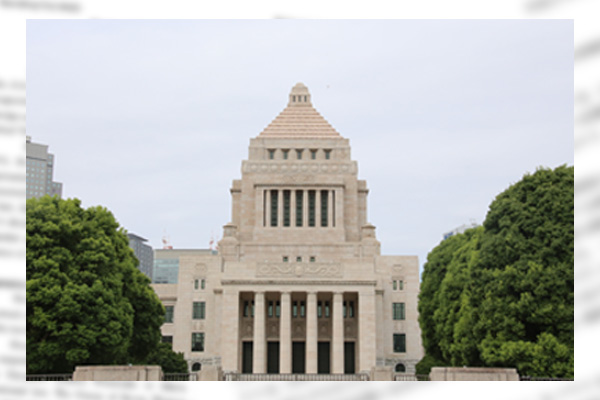While the National Diet is set to end its ordinary session on June 17, the Constitutional Democratic Party of Japan and other opposition parties are requesting to extend the session. The ruling Liberal Democratic Party rejects the request but plans to hold Diet meetings even during the recess, if necessary. If so, the two Diet chambers’ Commissions on the Constitution should meet during the Diet recess to promote deliberations on stalled issues including a pending revision of the National Referendum Act for constitutional amendments.
Major opposition parties refusing Commission meetings
When the National Diet passed a budget for the current fiscal year in late March, the LDP, its coalition partner Komeito and the Japan Innovation Party called for convening meetings of the Commissions on the Constitution, which have been set up to consider constitutional amendments and relevant matters. However, major opposition parties such as the CDP and the Democratic Party for the People have refused to hold such meetings for the reason of urgent measures to address the novel coronavirus outbreak. The reason was unreasonable because they accepted to convene other Diet standing committee meetings for ordinary deliberations. In the first place, if the novel coronavirus outbreak is a top priority, the commissions should have been convened to consider appropriate topics such as state of emergency laws including new constitutional provisions.
Due to the refusal by opposition parties, the commissions’ meetings during the ending ordinary Diet session were limited to only one at the House of Representatives.
Unlike the former Research Commissions on the Constitution designed for research into the constitution, the current Commissions’ main job includes the drafting of constitutional amendments and the deliberation of the National Referendum Act. They are decision-making bodies rather than research panels. Therefore, they have adopted majority rule.
Since traditional practices giving priority to agreement between ruling and opposition parties have been adopted for the operation of the current commission, however, it has been put in an abnormal situation where it is unable to meet without consent by opposition parties. Opposition parties have rejected the convocation of the meetings for unreasonable reasons, running counter to the practice of avoiding political wrangling long-held since the days of the Research Commissions on the Constitution.
As a result, a bill for revising the National Referendum Act to increase the number of voting stations to meet the revised Public Office Election Act has been left shelved for two years despite effective agreement reached between the ruling camp and opposition parties except the Japanese Communist Party.
The Diet has annually spent for the defunct commissions about 200 million yen of taxpayers’ money in the House of Representatives and about 160 million yen in the House of Councillors. Taxpayers should be more outraged at this huge waste of money.
Cowardly LDP
Sovereign voters have the right to decide on constitutional amendments. Unless the Diet proposes constitutional amendments, however, there will be no national referendum. The absence of such proposal deprives voters of opportunities to exercise sovereign rights.
The LDP, a cowardly ruling party, as well as opposition parties, is responsible for the absence. The LDP has won a series of national elections by pledging to amend the constitution, but it has no guts to meet voters’ expectations. There is a limit to voters’ patience. While opponents of constitutional amendments are desperate to block them, the LDP even with a dominant majority has failed to push such amendments. Are LDP members willing to be defeated without fighting?
In the face of the national coronavirus crisis, the Commissions on the Constitution should launch debate promptly on the development of state of emergency laws and constitutional amendments in preparation for the second and third coronavirus waves.
According to the rules for each of the commissions, its chairman is empowered to convene its meetings by fixing dates whether the Diet is in session or not (Articles 8 and 9-1) or must convene its meetings if requested by one-third or more of the commission members (Article 9-2).
To fulfill its duties, the commissions should meet as frequently as every week to discuss constitutional amendments to recover the past delays.
Akira Momochi is a director of the Japan Institute for National Fundamentals and a special professor at Kokushikan University.


